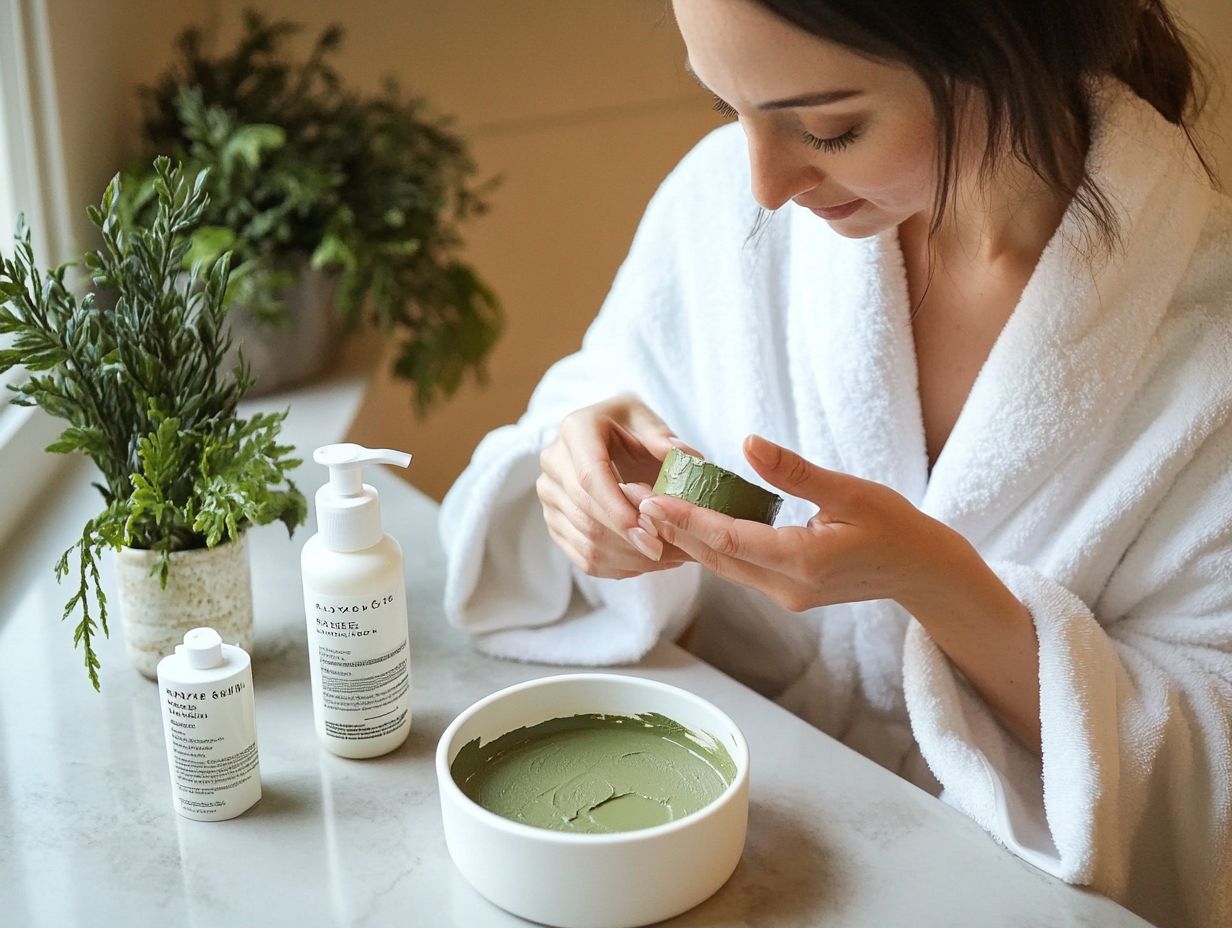Face masks have become an integral part of skincare routines, but I often find myself asking how frequently they should truly be utilized.
In this article, I delve into the significance of face masks, emphasizing their benefits for both skin health and appearance. I examine the various types of masks, including their materials and intended purposes, while also considering the factors that influence how often I should apply them.
While face masks can certainly enhance my beauty regimen, I also acknowledge the potential risks of overuse. My aim is to guide readers towards a personalized approach that yields optimal results.
Key Takeaways:
The Importance of Face Masks

I recognize that face masks play a crucial role in contemporary skincare routines, offering targeted solutions for a variety of skin types and concerns.
Whether it’s hydrating masks that replenish moisture or clay masks that detoxify and cleanse, these products are essential for addressing issues such as oily skin, dry skin, and acne-prone skin.
Given the rise of beauty trends that emphasize self-care, I appreciate how face masks can be tailored to meet individual skin needs, making them a preferred choice among dermatologists and skincare enthusiasts.
By utilizing the right ingredients, such as hyaluronic acid or vitamin C, I can significantly enhance my skin health.
Why Use a Face Mask?
Using a face mask offers numerous benefits for skin health, serving as an effective boost for hydration, rejuvenation, and the improvement of overall skin texture. Whether my goal is to minimize fine lines, enhance my glow, or simply indulge in some self-care, incorporating a face mask into my beauty routine significantly elevates my skincare regimen.
I recognize that different formulations cater to various skin types, which makes it essential to select one that meets my individual needs.
- For instance, clay masks work wonders for oily skin by effectively drawing out impurities and controlling excess oil.
- On the other hand, hydrating masks enriched with ingredients like hyaluronic acid are ideal for dry skin, delivering intense moisture and restoring balance.
- For those with sensitive or acne-prone skin, soothing formulas can reduce inflammation and calm irritation.
“`html
By regularly applying face masks, I not only enhance my skin’s texture but also promote a radiant and healthy appearance, making this practice a valuable investment in an effective skincare routine. For more insights on the topic, check out How Often Should You Really Be Using a Face Mask?.
“`
Types of Face Masks
I recognize that face masks come in a wide range of types, each specifically designed to address various skin needs and concerns.
From hydrating masks enriched with hyaluronic acid to clay masks tailored for oily skin, the options available ensure that there is a suitable choice for everyone.
I find that charcoal masks are particularly effective for their pore-cleansing properties, while exfoliating masks play a key role in removing dead skin cells and enhancing skin texture.
Furthermore, I appreciate the value of DIY masks, which provide customizable solutions for those who prefer natural ingredients and personalized skincare approaches.
Different Materials and Purposes

I recognize that face masks come in various materials, including sheet masks, gel masks, and clay masks, each designed to serve specific purposes and provide unique benefits tailored to different skin types.
For instance, sheet masks are highly convenient and often enriched with serums that contain natural ingredients. Gel masks offer a cooling effect, making them ideal for soothing irritated skin. On the other hand, clay masks excel at detoxifying and purifying oily skin, while charcoal masks are well-known for their ability to draw out impurities, which contributes to their popularity in the beauty industry.
I find cream masks particularly beneficial for dry or mature skin, as they deliver a rich infusion of moisture and nutrients that help restore elasticity and hydration. Hydrating masks, infused with hyaluronic acid or glycerin, are essential for plumping the skin and minimizing the appearance of fine lines.
Conversely, fiber masks provide a unique delivery system, ensuring an even distribution of active ingredients such as vitamin C or collagen, which can brighten the complexion and improve skin texture.
By understanding the distinct advantages of each type of mask, I can select the most suitable option to effectively address my specific skincare needs.
Frequency of Use
Determining the frequency of face mask usage is crucial for optimizing skin health and achieving the desired results, as both overuse and underuse can adversely impact skin conditions.
In my experience, hydrating masks can typically be applied more frequently than clay or exfoliating masks, which should be used in accordance with my skin’s unique needs and concerns.
By incorporating masks into my skincare routine at the appropriate intervals, I can significantly enhance my skin’s hydration and overall appearance.
Factors to Consider
When determining how often to apply face masks, I take several factors into account, including my skin type, specific skin concerns, and the ingredients of each mask. Consulting with a dermatologist has proven invaluable, as they offer insights into best practices for mask application, helping me achieve the desired effects while minimizing the risk of skin irritation.
I recognize that not all masks are created equal; their formulations can significantly affect their effectiveness based on my unique complexion. For example, I have found that clay masks are particularly beneficial for my oily skin, as they help control excess oil and prevent breakouts, whereas hydration-focused cream masks work wonders for dry skin types like mine.
Additionally, I understand that seasonal changes can impact the condition of my skin, which means I need to maintain a flexible approach to my masking routine. Regularly assessing my skin’s needs allows me to select the right products, supported by expert recommendations that address individual concerns, such as aging or sensitivity.
Benefits of Regular Use

I find that regular use of face masks can yield significant benefits for skin health, making them an essential component of my beauty routine.
By incorporating hydrating masks, exfoliating masks, and other targeted treatments, I can improve my skin texture, achieve a radiant glow, and effectively address various concerns such as fine lines and dryness.
Furthermore, I have noticed that masks can enhance the efficacy of my daily skincare products, including serums and moisturizers, leading to improved overall results.
Improved Skin Health and Appearance
Consistently using face masks can significantly enhance my skin health and appearance, contributing to a more vibrant and youthful complexion. By providing intensive hydration and nourishment, masks complement my regular moisturizing routine, which improves serum application and overall skin hydration.
These treatments are available in various types, each addressing different skin concerns and needs. For example, hydrating masks that are rich in hyaluronic acid penetrate deeply to quench dry skin, while clay masks detoxify and draw out impurities, resulting in a clearer and more refined complexion.
Additionally, sheet masks packed with vitamins and antioxidants can brighten my skin, combat signs of aging, and offer a soothing effect that reduces inflammation.
Regular use of these masks not only targets specific issues but also fosters a more balanced and healthy overall appearance, ultimately resulting in a glow that radiates confidence.
Potential Risks of Overuse
While I acknowledge that face masks can provide numerous benefits, I also recognize that overuse can present potential risks, including skin irritation and exacerbation of existing skin concerns.
It is important to understand that excessive application, particularly of masks containing active ingredients, can disrupt the skin barrier and lead to adverse effects such as redness and increased sensitivity.
Side Effects and Irritation

I have observed that common side effects of using face masks can include skin irritation, redness, and discomfort, particularly for individuals with sensitive skin. It is crucial for me to select masks that are suitable for my skin type and to carefully monitor how my skin reacts to new products, especially those that are hydrating and moisturizing. For more information on this topic, check out How Often Should You Really Be Using a Face Mask?.
Along with these reactions, I recognize that some individuals may experience breakouts, allergic reactions, or increased dryness due to specific ingredients found in masks. To mitigate these issues, I always conduct a patch test before using a new product extensively.
Choosing hypoallergenic and fragrance-free masks can significantly reduce the likelihood of irritation, making it essential for those with delicate skin to avoid harsh chemicals.
I find that regularly moisturizing my skin after applying a mask can also help alleviate any discomfort. Ultimately, being mindful of ingredient labels and opting for soothing formulas, such as those containing aloe vera or chamomile, can enhance my mask experience while effectively addressing the needs of sensitive skin.
How to Determine Your Ideal Usage
Determining my ideal face mask usage requires a clear understanding of my skin’s specific concerns, type, and the goals I aim to achieve through my skincare routine.
Consulting with a dermatologist allows me to receive personalized recommendations tailored to my individual skin needs, ensuring that I can maximize the benefits of the products I select.
Personalized Approach for Best Results
A personalized approach to face mask application is essential for achieving the best results in my skincare routine, as it allows me to effectively address specific skin health concerns. By tailoring my mask selection and application frequency to my unique skin type and needs, I can significantly enhance the efficacy of my skincare regimen.
Selecting the right face mask is crucial for maximizing benefits, given that different formulations target various skin issues. For example, I find that clay masks are particularly beneficial for my oily skin, as they help absorb excess oil and unclog pores. Conversely, for dry or sensitive skin, I prefer creamy or gel-based masks enriched with soothing ingredients such as aloe vera or hyaluronic acid to boost hydration.
I also pay close attention to my skin’s reactions and sensitivities, opting for products that are free from harsh chemicals and allergens. By incorporating a weekly routine that includes these personalized masks, I can improve hydration, clarity, and overall skin texture. Consistency, combined with customization, is essential for unlocking my skin’s true potential.


